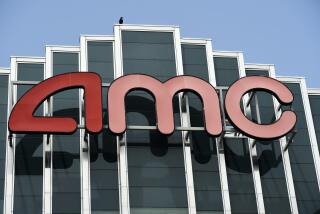MCA Stock Trades Briskly After ‘Poison Pill’ Is Unveiled
- Share via
MCA shares traded heavily Thursday following news that the company’s recently ailing chairman and largest shareholder returned home from the hospital and after a decision by MCA late Wednesday to set in motion a “poison pill” plan to thwart any unwelcome takeover bid.
The stock activity puzzled some Wall Street experts, who had previously questioned whether any serious bidder is accumulating shares of the Los Angeles entertainment giant. For the past week, traders speculated that the condition of 74-year-old Lew R. Wasserman, MCA’s longtime chief executive, might make the company vulnerable to a takeover bid.
After a delay in opening on the New York Stock Exchange, MCA shares traded as low as $54.50, then recovered to close at $57.125, down just 62.5 cents from the previous day, when a new 52-week high was established. More than 1.35 million shares changed hands. By contrast, MCA’s average daily volume has been just 374,639 shares this year.
“It was really weird. The arbs (arbitrageurs) dumped (their stock); it was down to $55, then somebody kept buying,” said one investment banker who specializes in the entertainment field. “I thought it would be at $53 before the day was over.” (Arbitrageurs are Wall Street professionals who speculate in the stocks of potential takeover targets.)
Some analysts suggested that MCA may have opened the door to a friendly bid with its announcement late Wednesday that, despite its poison pill, the company would give a fair hearing to any well-financed or cash offer for 100% of MCA if the prospective buyer acquired no more than 1% of MCA’s stock before announcing its intentions.
“Who the hell would buy at this point,” the banker asked, unless “somebody thinks that was an invitation to buy it?”
But in a telephone interview, MCA President and Chief Operating Officer Sidney J. Sheinberg made clear Thursday that MCA has not placed itself on the block.
“We’re not basically soliciting anything,” Sheinberg said, explaining that if a company “had an offer that was all cash and was a fair offer and complied with the terms” outlined in MCA’s announcement, “I don’t think there is any board of directors in America” that could refuse to consider it.
Harold Vogel, a Merrill Lynch analyst who has followed MCA for 18 years, said: “In the last 20 years, sale has been considered three times that we know about.” Vogel alluded to MCA’s aborted plan in 1968 to merge with Westinghouse, then in 1969 with Firestone Tire & Rubber Co. Two years ago, MCA was widely reported to be negotiating a merger with RCA, but those talks collapsed, too.
“I tend to think that if someone wants to take over this company, and is willing to pay the price for it, they can do it,” Vogel said. “But in the same breath, no one is emerging from the group of potentially interested parties that are often mentioned.”
At current stock prices, MCA would cost more than $4 billion to acquire.
Under MCA’s bylaws, a merger would require 80% approval of MCA’s eight-member board and 75% of its shareholders. About 18.5% of the company’s stock is controlled by Wasserman, other executives and directors, and trust funds over which Wasserman has some sway.
Wasserman was released Wednesday after a three-week hospitalization at Cedars-Sinai Medical Center, where he had polyps removed from his colon in June. “To the best of my knowledge,” Sheinberg said, “he is totally well, coming along very well and expected back at work.”
The poison pill plan approved by MCA directors late Wednesday would give shareholders the right to purchase a total of 760,000 shares of new preferred stock “to guard against partial tender offers and other abusive tactics.” If a raider acquires 20% or more of MCA’s stock, the rights would enable MCA shareholders to buy their own company’s common stock at a deeply discounted price.
In a letter to shareholders, MCA said it was not distributing the rights “in response to any specific effort to acquire control of the company.”
More to Read
The biggest entertainment stories
Get our big stories about Hollywood, film, television, music, arts, culture and more right in your inbox as soon as they publish.
You may occasionally receive promotional content from the Los Angeles Times.










